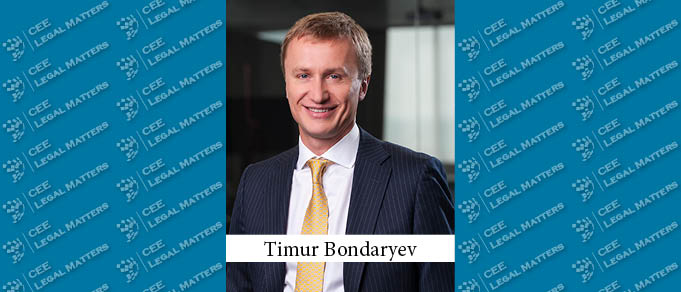Despite the challenges, Ukraine’s internal economy remains strong – and there are significant opportunities for those who can navigate the complexities of the current situation – with lawyers busy with litigation and arbitration, sanctions and antitrust, as well as restructuring and privatization matters, according to Arzinger Founding and Managing Partner Timur Bondaryev.
“Over the past year and a half, both colleagues and clients have been closely monitoring the war situation. It has been a challenging period, but it has also made us stronger,” Bondaryev begins. “We are grateful to the people and governments from other jurisdictions who have supported us during this time. It took a while, but we appreciate everyone who has stood by us.”
“We are confident that Ukraine will survive and ultimately win the war with Russia and it's just a matter of time before we can resume our operations as before,” Bondaryev says. “Our pipeline is solid, although not as active as before the invasion. However, once the war is over or there is a framework for peace, we anticipate a significant increase in workload.” He believes that “for the next two decades, lawyers will be busy rebuilding and shaping the new Ukraine while also pursuing the necessary legal actions to claim damages from the aggressor.”
Sharing more about his firm’s workload, Bondaryev points to litigation, sanctions, white-collar crime, and arbitration: “We have been involved in international litigation to claim damages from Russia, which has kept us extremely busy. Additionally, our IP, patent, and tax departments have seen a substantial workload. Disputes, including patent, tax, commercial, and arbitration cases, have been booming across all sectors.” Furthermore, he reports an increase in mandates related to insolvency and debt restructuring, as well as the privatization of state-owned assets. “We were lucky that, due to the firm’s market position and recognition, we always had work,” he explains. “While it wasn’t always great, or interesting, or that profitable, we were busy. And now we’re busier, having to increase headcounts, and we’re bringing people back to Ukraine.”
“And the infrastructure sector has had to adapt to the disruption of sea routes and transition to rail transportation, complicated by the wide-gauge/narrow-gauge disparity between railways in Ukraine and Romania or Poland,” Bondaryev reports. “Rebuilding supply and logistics chains, especially for grain exports, has been a priority for the country, and our lawyers as well.” Additionally, a privatization process has been initiated by the government, “focusing on keeping national champions and selling off other state-owned assets. And that pool of assets has increased with the freezing and nationalization of formerly Russian-owned assets that are now also up for sale. This has opened up opportunities for both investment and legal work,” he says.
In Ukraine, the antimonopoly agency plays “a significant role in controlling investments and outflows,” Bondaryev notes, “and is incredibly busy right now. Although we do not work for Russians, some of our clients have JVs or business relationships with Russian entities. It requires a lot of careful navigation to ensure the smooth progression of transactions for our clients.”
In terms of clients, according to Bondaryev, “the war and subsequent currency restrictions have led to a significant amount of capital being stuck in Ukraine. This has fueled M&A activity, as companies are utilizing their available capital for acquisitions and privatizations.” Due to the circumstances, “the assets are usually undervalued significantly and many local players, who recognize the value of these assets, have been active in privatization processes.”
“Most of our clients are companies that have been operating in Ukraine even before the war started. These clients have a deep understanding of the market and are adept at managing the associated risks,” Bondaryev explains. “We also work with foreign investors, particularly those in the agriculture sector, who have a long-standing presence in Ukraine. Furthermore, we have observed opportunistic risk-takers from outside Ukraine, especially in private equity, eyeing formerly Russian-owned assets.”















